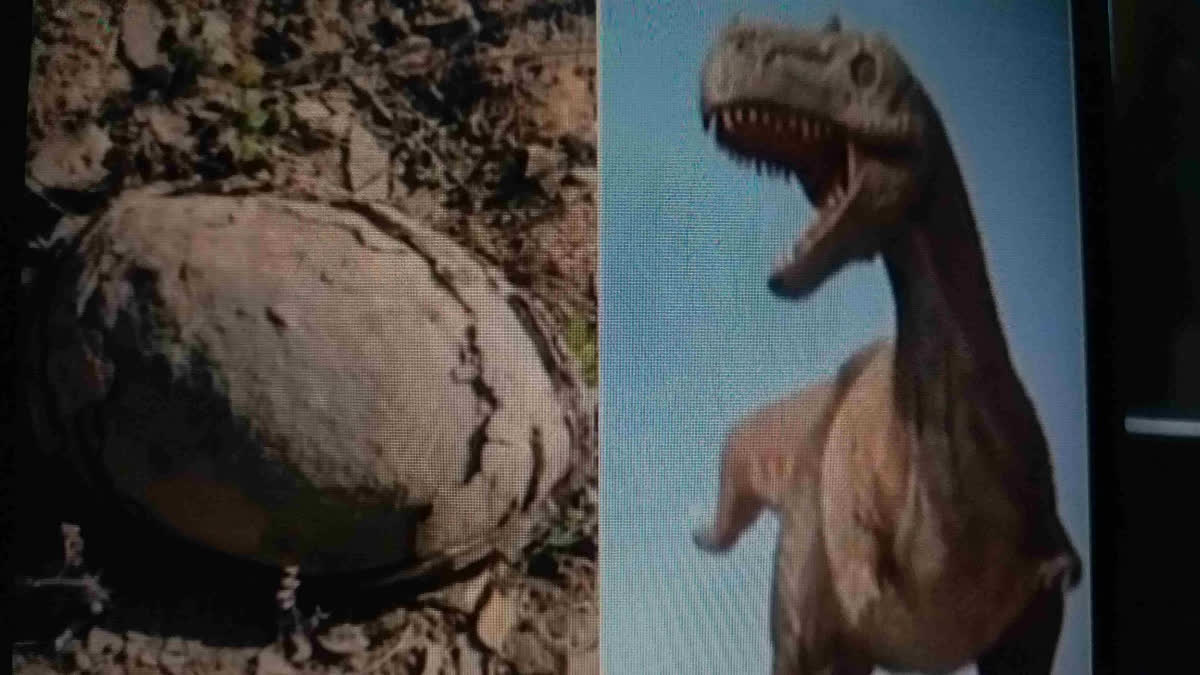Madhya Pradesh: The team of Birbal Sahni Institute of Archeology of Lucknow has discovered eggs of 7 crore-year-old dinosaurs in the Dhar district of the state. The team launched an investigation in some villages in the Bagh area and collected samples as remains of dinosaurs in Zamana, Pura Takri Ghoda, and Jhabaa villages.
According to reports, the villagers used to worship these eggs as a symbol of idols. These eggs were mostly in oval or circular shapes. Farmers used these eggs to protect their crops.
When archaeologist MG Thakkar of Lucknow examined the archaeological remains, he found out that these were not idols but dinosaur eggs. The news also surprised the villagers as they found out that what they were worshipping was nothing but eggs.
Dhar Divisional Forest Officer (DFO), Ashok Solanki said, “The Narmada Valley of Madhya Pradesh has been witness to the remains of the dinosaur era since the beginning. Apart from tigers, dinosaur eggs have also been found here. Some eggs from Dhar are in the Archaeological Museum of Indore."
And he added, "Currently, the circular and oval stones examined by the Lucknow team are also dinosaur eggs which the villagers have been worshipping as family deities as per their belief."
He elaborated, “In June last year, a similar rare egg was found here. These eggs were discovered by a team of researchers from Delhi University. Another egg was found inside one egg. The researchers informed that the egg discovered was 100 times larger than the normal”.
“From this discovery, it was believed that the reproduction of dinosaurs is similar to that of turtles and other reptiles”, he said.
Earlier in 2023, a video showing “Dinosaur eggs” in Tamil Nadu’s Perambalur district was circulating on social media after which geological experts reached the spot to examine the remains and rejected the widely circulated theories, stating that the fossilised rocks that resembled dinosaur eggs were most likely ammonite deposits.
However, geological experts, who reached the spot to analyse the findings, have debunked the viral claims, saying the Dinosaurus eggs-like fossilised rocks were most likely ammonite sediments.
What are ammonites? According to information on nationalgeographic.com, ammonites were once among Earth's most successful and varied organisms. Their characteristic multi-chambered shells were covered with tentacles-like squids. They were marine predators. Since ammonoids are a huge and diverse group of creatures that evolved throughout the Devonian period, which began around 416 million years ago, ammonite is a common term for them.
Ammonites have survived three major extinctions, the most famous of which was the Permian extinction, which destroyed 96% of marine life in the world approximately 252 million years ago due to global warming caused by volcanic activity.
The group's leader, Ramesh Karuppiah, reportedly stated that the marine species may have been mistaken for a dinosaur egg after becoming trapped in the concretion process for centuries.
The groups were formed by the members of Mannin Mainthargal and Kalmaram Kappom.In the Aanaivari stream, they also discovered a piece of fossil tree that was around two meters (seven feet) in length and 76 cm (30 inches) in thickness.
According to a source from the Geographical Survey of India, the area is well-known for these discoveries.
The area is famous for these discoveries, according to a source from the Geological Survey of India.
Geologists in southern India reported earlier in October 2020 that they had discovered hundreds of dinosaur egg clusters close to an ancient riverbed in Tamil Nadu, even though these fossilised eggs turned out to be something else. Scientists estimate that the egg cluster maybe 65 million years old.
Read More



